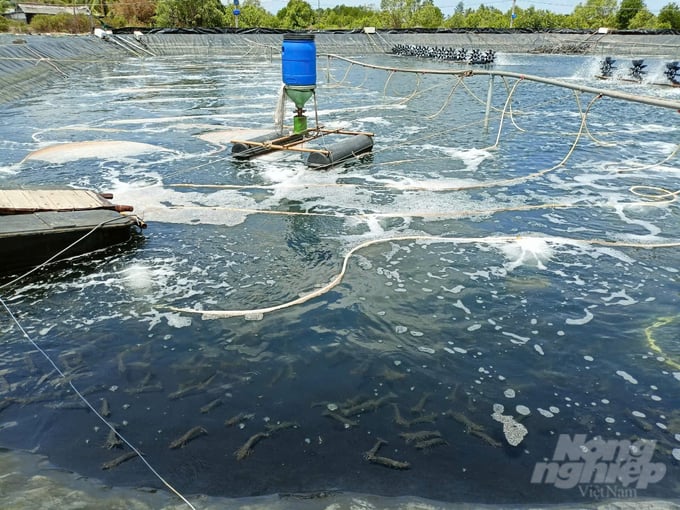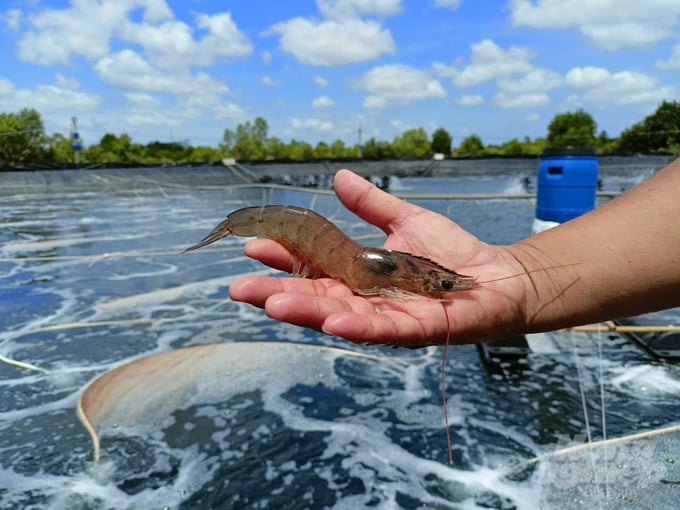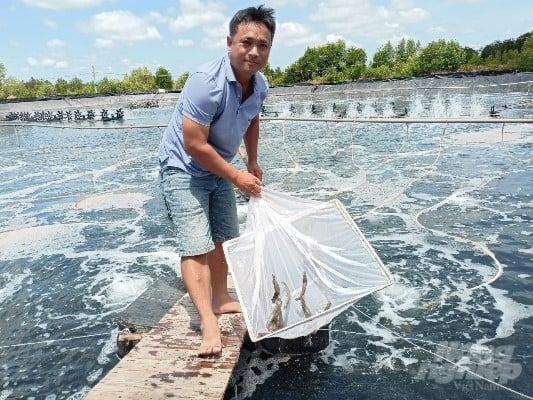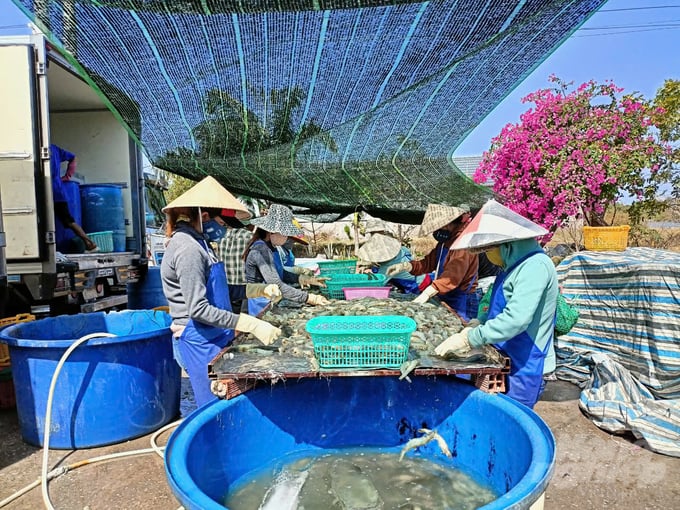November 25, 2025 | 13:35 GMT +7
November 25, 2025 | 13:35 GMT +7
Hotline: 0913.378.918
November 25, 2025 | 13:35 GMT +7
Hotline: 0913.378.918

The high-tech shrimp farming model of Mr. Nguyen Thanh Binh. Photo: Trong Linh.
After graduating from Can Tho University in 2005 with a degree in aquaculture, Mr. Nguyen Thanh Binh (residing in Nam Can Town, Nam Can District, Ca Mau Province) spent a long time working in the aquaculture medicine field for super-intensive shrimp farming. Mr. Binh studied shrimp behavior thoroughly, gaining and accumulating valuable experience.
Unlike many others, Mr. Binh chose to farm shrimp using herbal medicine, saying no to banned substances and antibiotics with high residue levels. His goal is to maintain environmental stability and ensure that the natural environment is not polluted.
“Protecting the environment means safeguarding the ecosystem in nature to ensure sustainable development. If the environment is polluted, farming becomes ineffective due to the emergence of many harmful pathogens for shrimp. Therefore, I choose prevention over treatment, and farming shrimp with herbal medicine is my optimal choice. Although farming shrimp with herbal medicine is more labor-intensive than using antibiotics, it allows me to provide a clean product to the market”, Mr. Binh said.

Herbal medicine helps improve the digestion and nutrient absorption of shrimp, which in turn promotes better growth and enhances meat quality. Photo: Trong Linh.
Currently, Mr. Binh has about 10 areas for high-tech shrimp farming using herbal medicine, each ranging from 20 to 40 ha. According to him, everyone has different methods of farming and caring for shrimp, but most farmers today follow antibiotic protocols.
"As for me, I strive to minimize the use of antibiotics because if I do, I can only succeed in the first few harvests; the success rate will decline in subsequent cycles. Farming shrimp without antibiotics will create a sustainable environment for future generations. If we only focus on making money and farm recklessly, there will come a time when it will no longer be effective", Mr. Binh said.
According to Mr. Binh, farming shrimp with herbal medicine is more challenging because it requires constant monitoring of the shrimp. Herbal medicine primarily helps prevent diseases and boost resistance, while antibiotics may still be used but at a moderate level when necessary.
"I have several types of herbal medicine that I use in shrimp farming to replace antibiotics. About every five days, I mix the herbs into the feed for the shrimp. Since there are now many farmers, environmental factors have become increasingly complex. Therefore, we must protect the farming environment from pollution", Mr. Binh said.

Mr. Binh is checking the shrimp. Photo: Trong Linh.
Mr. Binh’s principle in shrimp farming is that whenever he wants to use a certain type of medicine, he must conduct thorough research first. Only then does he incorporate it into the farming process to ensure stability and achieve the highest effectiveness. During the farming process, managing the environment is crucial. If the water environment is well-managed, the success rate is very high, while medicine is mainly a supplementary component for nurturing the shrimp.
According to Mr. Binh, shrimp are very susceptible to diseases, so he constantly observes and cares for them carefully during the farming season. "Caring for shrimp is like caring for a baby; it requires meticulous attention to achieve high results. If you just release the breeds without providing food or improving the nutrient sources, the shrimp won’t survive", Mr. Binh analyzed.
Mr. Binh pointed out that when the environment becomes unbalanced, it’s not that the soil lacks nutrients, but rather that these components are no longer essential for the shrimp. At that point, necessary minerals may be depleted, so we need to supplement them immediately. Larvae, jellyfish, and water eggs are examples of nutritious plankton that are beneficial for the aquaculture environment.
"Shrimp raised with antibiotics will have a foul smell when consumed, while shrimp farmed with herbal medicine are clean and safe, resulting in a sweet and rich taste", Mr. Binh explained.
Since starting his super-intensive shrimp farming using herbal medicine, Mr. Binh has achieved a very high success rate. He is willing to share his experiences and farming techniques with anyone interested. For him, if everyone adopted the herbal shrimp farming model, it would help preserve the natural ecosystem and promote sustainable development.
Additionally, thanks to the experience he has accumulated during the farming process, Mr. Binh is able to treat common diseases in shrimp, such as acute hepatopancreatic disease, white feces syndrome and liver atrophy.

Shrimp products raised using biological methods without antibiotics are favored by consumers for their safety and high quality. Photo: Trong Linh.
“If shrimp are affected by white feces syndrome and farmers use antibiotics, the shrimp will never grow anymore. At that point, the only way to help the shrimp recover and grow is by using herbal medicine or adjusting the environment", Mr. Binh said.
Mr. Tran Doan Hung, Vice Chairman of the Nam Can District People’s Committee, shared: "Currently, shrimp farmers employ various super-intensive farming methods. To assess quality, we need results from relevant authorities. If this model proves effective, the local government will recognize and promote it".
Farming shrimp with herbal medicine is a natural alternative to using antibiotics and chemicals in aquaculture. This method is gaining attention due to its many benefits. Currently, shrimp products raised using biological methods without antibiotics are favored by consumers for their safety and high quality. However, to achieve optimal effectiveness, it is essential to conduct thorough research on the dosage, usage methods and the appropriate combination of herbal medicines for each developmental stage of the shrimp.
Translated by Phuong Linh

(VAN) The information was shared at the seminar 'Urban Agriculture - Solutions for Developing Green Spaces,' organized by the Kinh te & Do thi Newspaper and the Biotechnology Center of Ho Chi Minh City.
/2025/11/19/4141-2-132831_216.jpg)
(VAN) One of Japfa's outstanding solutions is implementing digital transformation and artificial intelligence (AI) to optimize operations, enhance productivity, and advance sustainable development.
/2025/11/19/4847-1-093540_448.jpg)
(VAN) The Gia Lai Provincial People’s Committee had a working session with the delegation of the U.S. Department of Agriculture, the State of Idaho, and representatives of the State's leading enterprises.

(VAN) Ca Mau has a sufficient foundation to become a strong regional aquaculture center, where production integrates the economy, the environment, and the lives of the people.

(VAN) SEIKI Group envisions itself as a pioneer in the ‘dual transformation’ of digital technology and green industry, standing alongside the Government and Vietnamese businesses in their pursuit of sustainable development.

(VAN) The VNGEONET network affirms Viet Nam's progress in mastering digital space, providing a precise positioning data platform to serve socioeconomic development.
/2025/11/14/3247-1-184556_35.jpg)
(VAN) Thai Nguyen is methodically implementing digital transformation in the livestock sector, laying the foundation for a modern, transparent, and sustainable agriculture.